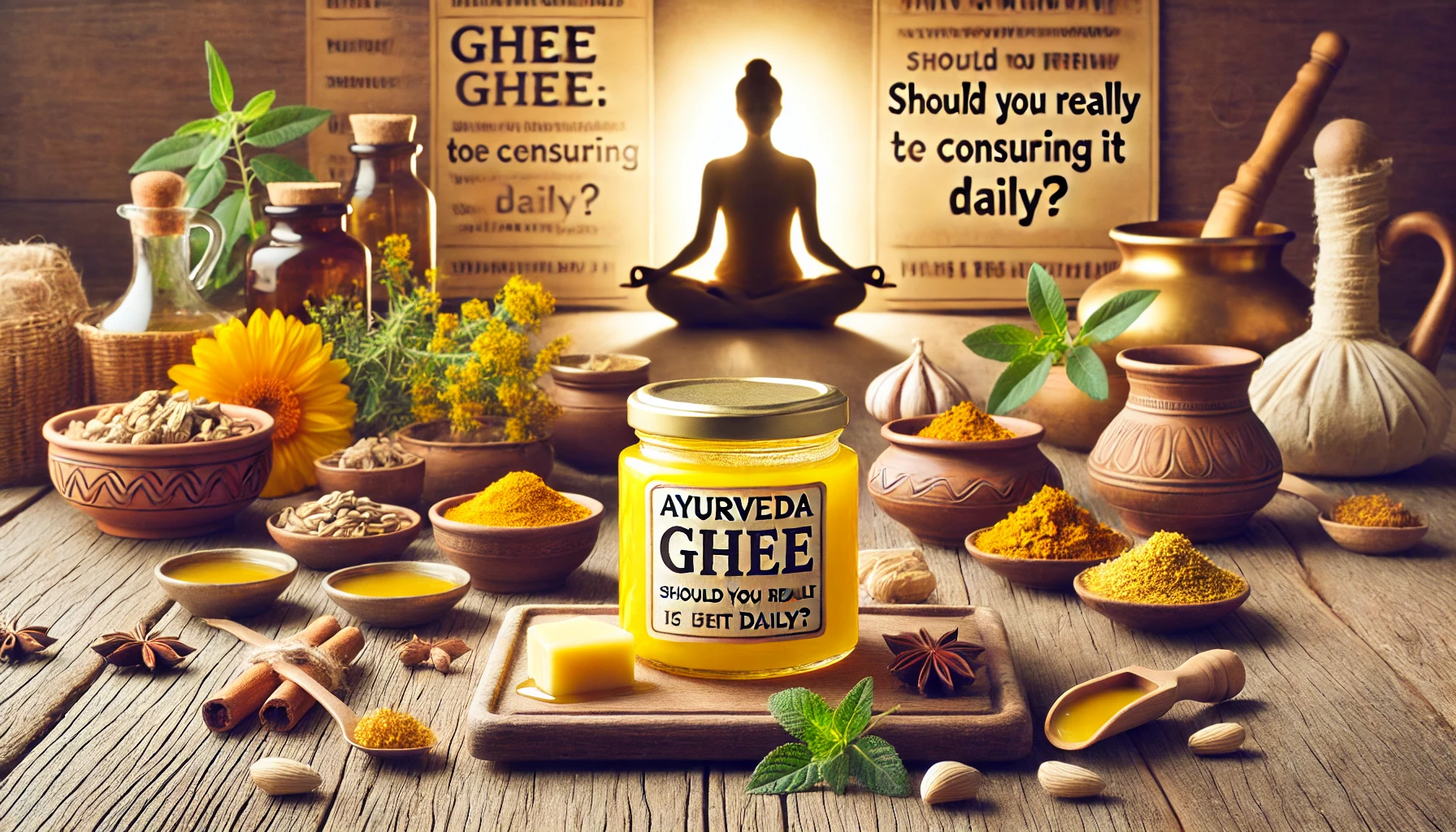- You have no items in your shopping cart
- Subtotal: ₹0.00
Ayurveda and Ghee: Should You Really Be Consuming It Daily?
Ayurveda, the ancient Indian system of medicine, has long advocated the use of ghee as a central component of health and wellness. Known as clarified butter, ghee is revered in Ayurvedic traditions for its nourishing, rejuvenating, and balancing properties. From promoting digestion to enhancing immunity and even nurturing mental clarity, ghee has been lauded as a superfood in Ayurveda for centuries.
But in today’s modern dietary landscape, with changing lifestyles, diverse eating patterns, and the rise of new health philosophies, the question arises: should everyone really be using ghee daily? Is ghee as universally beneficial as Ayurveda claims, or are there certain circumstances where ghee may not be the best choice?
In this blog post, we will explore the Ayurvedic perspective on ghee, examine the health benefits it offers, and delve into the modern controversies surrounding its consumption. We’ll also look at scientific studies to back up the claims, offering a balanced view on whether ghee should be part of your daily diet.
What is Ghee?
Before diving into its benefits and controversies, it’s important to understand what ghee is. Ghee is a form of clarified butter that has been cooked longer to remove all water content and milk solids. This process makes ghee shelf-stable without refrigeration and imparts it with a rich, nutty flavor.
Traditionally, ghee is made from cow’s milk and is often used in cooking, religious rituals, and Ayurvedic medicine. It’s considered a Sattvic food in Ayurveda, meaning it promotes purity, health, and positive energy.
Ayurveda and Ghee: A Long-Standing Tradition
In Ayurvedic texts, ghee is considered the ultimate fat for human consumption. The classical texts of Ayurveda, such as the Charaka Samhita and Sushruta Samhita, mention ghee as a remedy for a wide variety of ailments and an essential dietary component for maintaining overall health.
Ayurvedic Benefits of Ghee
- Improves Digestion: According to Ayurveda, ghee stimulates Agni (digestive fire), helping to improve digestion and absorption of nutrients. It’s often prescribed for individuals with weak digestion or malabsorption issues.
- Balances Doshas: Ayurveda is based on the concept of Doshas—Vata, Pitta, and Kapha. Ghee is said to balance all three doshas, making it suitable for most body types. It particularly pacifies Vata and Pitta doshas, which are associated with dryness, inflammation, and heat.
- Lubricates Tissues: Ghee is believed to nourish Ojas, the subtle essence of all body tissues, providing strength and vitality. It is also known for its lubricating properties, which help to moisturize the body from the inside out, making it particularly beneficial for those with dry skin or joint problems.
- Enhances Mental Clarity: Ghee is said to improve cognitive function and mental clarity. It’s often used in Ayurvedic practices to support Medhya Rasayana, or therapies that enhance intelligence, memory, and focus.
- Promotes Longevity: In Ayurveda, ghee is considered a Rasayana, a substance that promotes longevity, vitality, and overall health. It’s said to have anti-aging properties and is used in various rejuvenation therapies.
- Supports Immunity: Ghee is rich in butyrate, a short-chain fatty acid that supports gut health and strengthens the immune system. Ayurveda links a healthy digestive system to strong immunity, and ghee plays a central role in this connection.
- Acts as a Carrier for Herbal Medicine: In Ayurvedic formulations, ghee is often used as a medium to deliver herbs and medicines. Its ability to penetrate deep into tissues makes it an ideal carrier for herbal preparations.
Ayurvedic Uses of Ghee
Ghee is not just consumed internally; it’s also applied externally and used in various therapeutic practices in Ayurveda.
- Nasya Therapy: In Nasya, or nasal therapy, ghee is often used to lubricate and protect the nasal passages, especially in cases of dryness or sinus issues.
- Netra Basti: Ghee is also used in Netra Basti, an Ayurvedic treatment where ghee is applied to the eyes to improve vision and alleviate eye strain.
- Abhyanga: In Abhyanga, a traditional Ayurvedic massage, ghee is used to nourish the skin and relieve tension from muscles and joints.
The Modern Controversy: Should Everyone Be Using Ghee?
Despite its numerous benefits, there is growing debate around the modern consumption of ghee, particularly in light of evolving dietary trends and scientific research. Some of the most common points of contention include:
1. High Saturated Fat Content
One of the main criticisms of ghee is its high saturated fat content. For years, saturated fat has been linked to increased cholesterol levels and a higher risk of heart disease. Given that ghee is 62% saturated fat, many modern health experts argue that it should be consumed in moderation or avoided entirely, especially for individuals with heart conditions or high cholesterol.
Scientific Perspective on Saturated Fat
Recent studies, however, challenge the traditional view on saturated fat. A review published in the British Medical Journal found no significant evidence that saturated fat increases the risk of cardiovascular disease. Another study in the Journal of Clinical Lipidology suggests that not all saturated fats are equal, and some, like those found in ghee, may actually support heart health by raising levels of HDL cholesterol (the “good” kind) without significantly affecting LDL cholesterol (the “bad” kind).
2. Lactose Intolerance
Because ghee is made from butter, there’s a misconception that it contains lactose and is unsuitable for individuals with lactose intolerance. However, the process of clarifying butter to make ghee removes the milk solids, including lactose and casein, making it generally safe for those who are lactose intolerant.
3. Weight Gain and Obesity
Another modern concern is the idea that ghee contributes to weight gain due to its high-calorie content. With the rise of low-fat diets and calorie-conscious eating habits, many people view ghee as a food to avoid if they’re trying to lose weight or maintain a healthy weight.
Ayurvedic Perspective on Weight Management
Ayurveda takes a different view. According to Ayurvedic principles, the key to maintaining a healthy weight is a well-balanced digestive system. Ghee, by improving digestion and nutrient absorption, can actually aid in weight management. Additionally, the medium-chain fatty acids in ghee are easily metabolized by the liver and used for energy, rather than being stored as fat.
4. Veganism and Ethical Concerns
One of the biggest controversies surrounding ghee, particularly in modern dietary circles, is its incompatibility with veganism. Ghee is an animal product, and for ethical vegans, this is a deal-breaker. They argue that the consumption of any animal product, including ghee, contributes to the exploitation of animals.
Sustainable and Ethical Sourcing
However, not all ghee is created equal. Traditional, ethically sourced desi cow ghee, made from the milk of grass-fed cows that are treated humanely, is seen by some as a more sustainable and ethical choice. In Ayurvedic tradition, cows are considered sacred, and their milk is viewed as a gift rather than a commodity.
Who Should Avoid Ghee?
While ghee offers numerous benefits, Ayurveda also acknowledges that it may not be suitable for everyone, particularly in cases of certain health conditions or imbalances.
1. Kapha-Dominant Individuals
According to Ayurveda, individuals with a dominant Kapha dosha—characterized by heaviness, sluggishness, and a tendency toward weight gain—should consume ghee in moderation. Because ghee is heavy and oily, it can exacerbate Kapha imbalances and lead to weight gain, sluggish digestion, and other Kapha-related issues.
2. People with High Cholesterol or Heart Disease
Although recent studies suggest that ghee may not be as harmful to heart health as once thought, it’s still a rich source of saturated fat. Individuals with high cholesterol or pre-existing heart conditions should consult a healthcare professional before incorporating ghee into their diets.
3. People with Fatty Liver Disease
Those with fatty liver disease or other liver-related conditions should also be cautious when consuming ghee. While ghee can support digestion and nutrient absorption, it’s still a rich, high-fat food that could place extra strain on an already compromised liver.
Scientific Studies Supporting Ghee
Several modern scientific studies have explored the health benefits of ghee, offering evidence that aligns with traditional Ayurvedic beliefs.
Ghee and Heart Health
A study published in the Journal of Biomedical Research found that ghee consumption increased levels of HDL cholesterol while having minimal effects on LDL cholesterol. The researchers concluded that ghee could be included in a heart-healthy diet when consumed in moderation.
Ghee and Gut Health
Another study in the Indian Journal of Medical Research explored the effects of butyrate, a short-chain fatty acid found in ghee, on gut health. The researchers found that butyrate helps to nourish the gut lining, reduce inflammation, and support overall digestive health.
How to Incorporate Ghee into Your Diet
If you’re interested in reaping the benefits of ghee, here are some simple ways to incorporate it into your daily diet:
- Cooking: Use ghee as a cooking oil for sautéing, frying, or roasting. Its high smoke point makes it ideal for high-heat cooking.
- Spreading: Spread ghee on toast, chapatis, or rotis as a delicious alternative to butter.
- Baking: Substitute ghee for butter in baking recipes for a richer flavor and added nutritional benefits.
- In Ayurvedic Teas: Add a teaspoon of ghee to your herbal teas or golden milk (turmeric milk) for a soothing, anti-inflammatory drink.
Conclusion: Should You Really Be Consuming Ghee Daily?
In conclusion, ghee offers numerous health benefits according to both Ayurveda and modern science, from supporting digestion and cognitive function to promoting heart health. However, it’s essential to consume ghee in moderation and consider your unique constitution and health needs.
For most people, especially those with Vata or Pitta imbalances, ghee can be a nourishing, balancing addition to the diet. However, individuals with Kapha imbalances, heart conditions, or liver issues should consult a healthcare provider before making ghee a regular part of their diet.
Ultimately, the decision to consume ghee daily should be based on individual health considerations, as well as an understanding of the body’s unique needs. Ayurveda offers valuable insights into how ghee can support health and wellness, but like any food, it should be consumed mindfully and in moderation.




